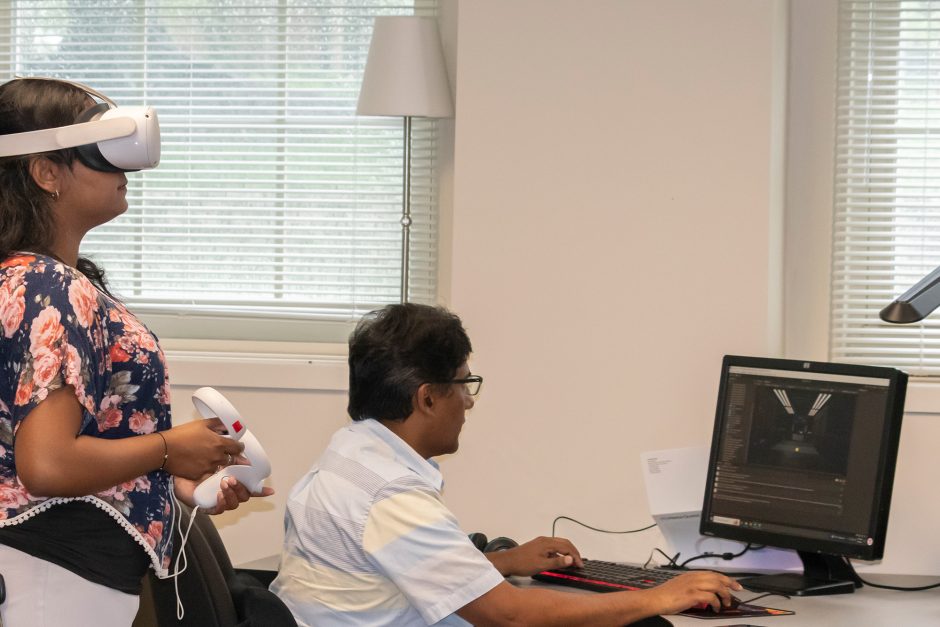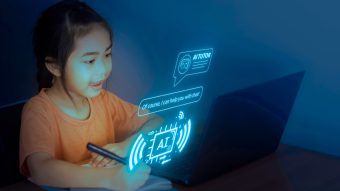
Sept. 12, 2024
Contact: Janese Heavin, heavinj@missouri.edu
Put on a pair of virtual reality (VR) goggles and step into a vault of computer servers and screens. Use your controllers to move forward onto a launch pad, which will trigger a cybersecurity challenge. Pass the test and move on to the next room. Need help? Just summon your digital droid named Robi and ask a question.
Welcome to USucceed, a platform University of Missouri researchers are building to teach cybersecurity to individuals with autism, dyslexia, attention-deficit disorders and other neurodevelopmental differences.
The platform serves two critical functions, said Noah Glaser, an assistant professor and director of the Information Experience Laboratory in Mizzou’s College of Education and Human Development. First, it aims to address the growing need for a skilled cybersecurity workforce. Second, it prepares neurodivergent adults for lucrative and rewarding careers.
“Technology is everywhere,” Glaser said. “The more devices we have, the more security issues become prevalent, and the more data is taken, stolen and leaked. What we’re doing is helping bring neurodivergent individuals into the STEM workforce.”
Harnessing unique strengths

Since the 1990s, research has linked individuals with neurodevelopmental differences, particularly autism, to excelling in computer-related fields. This is often attributed to a logical thinking style. Virtual reality environments are especially suitable because settings can be changed to meet individual needs. For instance, lighting can be adjusted, stimuli can be reduced and settings can be customized.
“Participants are learning these important skills in a VR environment that is safe, controllable, adaptable and customizable to their unique skills and needs,” Glaser adds.
Glaser and Prasad Calyam, the Greg L. Gilliom Professor in Cyber Security and Director of the Cyber Education, Research and Infrastructure Center (CERI), in Mizzou’s College of Engineering, began building the platform last fall with funding from the National Science Foundation.
And young adults aren’t just learning to use the platform; they’re also helping design it. Neurodivergent individuals from Mizzou’s Thompson Center for Autism and Neurodevelopment’s STRIVE program for individual vocational experiences and Mizzou’s Preparing Adults for Work and Society (PAWS) program have been working alongside researchers, providing valuable insights and expertise.
“Recognizing the importance of engaging neurodivergent students in ways that support workforce development, we partnered with PAWS, to ensure these voices are central to the project,” Glaser said. “We’re teaching these individuals how to work in cyber environments, and they’re helping us build the program — getting paid while they learn cybersecurity and develop the game.”
Seven individuals assisted with the project this past school year, none of whom had prior cybersecurity experience. They were able to develop the system and learn the material in less than four months, Glaser said.
Expanding capabilities
This summer, participants in Calyam’s NSF-funded Research Experience for Undergraduates (REU) program helped further enhance the platform’s capabilities. More individuals from community programs will be hired this fall to continue building and testing the platform.
Once completed, the game will feature multiple levels, similar to an escape room challenge. The difficulty of each level can be adjusted based on a participant’s prior performance.
“In the first phase, we’re building a room to introduce users to the platform and concepts around cyberattacks,” Calyam said. “In later, more advanced rooms, they’ll apply what they’ve learned about cybersecurity to more sophisticated mock attacks. They’ll have to use their knowledge and use the assistance of the AI-based pedagogical agent 'Robi' that we are developing to come up with creative solutions to various problems.”
Glaser said the ultimate goal is to scale up the platform and release it as open-source software so anyone can use it and adapt it to their needs.
“We’re passionate about working with neurodivergent individuals, but this tool can be used for any audience wanting to teach students to work in cybersecurity,” he said. “Even the smaller components, such as the AI agent, Robi, are novel and can be built upon and adapted to different environments. But our biggest takeaway so far? Don’t underestimate people because they have a diagnosis.”



